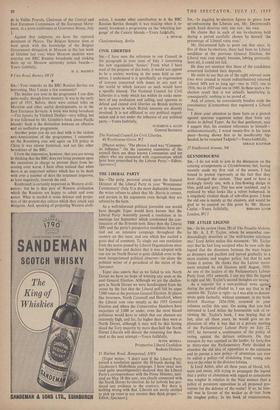SIR,—Your remarks on the BBC Russian Service are interesting. May
I make a few comments?
The decline you note in the programme I can date quite easily, though from memory. It was in the early part of 1953. Before, there were critical talks on Marxism and other useful developments, as in the East European Services. A book was being broadcast —Tito Speaks, by Vladimir Dedijer—very telling, but it was followed by Mr. Grimble's book about Pacific Islands! Such is the distinction between an effective and an ineffective programme.
Another point you do not deal with is the Violent anti-Americanism of the programmes. I remember on the Rosenberg case and again on US policy in China it was almost hysterical, and not like other broadcasts of the BBC.
I form the impression, however, that you are wrong In thinking that the BBC does not bring pressure upon the executives in charge to prevent them from be- coming even worse. I have often noticed that when there is an important subject which has to be dealt with over a number of days the treatment improves, at least negatively, towards the end.
Rembrandt is certainly important in Western civili- sation : but he is that part of Western civilisation which the Russians are happy to admit and even annex. What is needed is some defence and projec- tion of the present-day culture which they attack and denigrate. And, speaking of projecting Western civili-
sation, I wonder what contribution to it the BBC Russian Service thought it was making when it re- cently broadcast a programme on the 'whistling lan- guage' of the Canary Islands.—Yours faithfully,














































 Previous page
Previous page